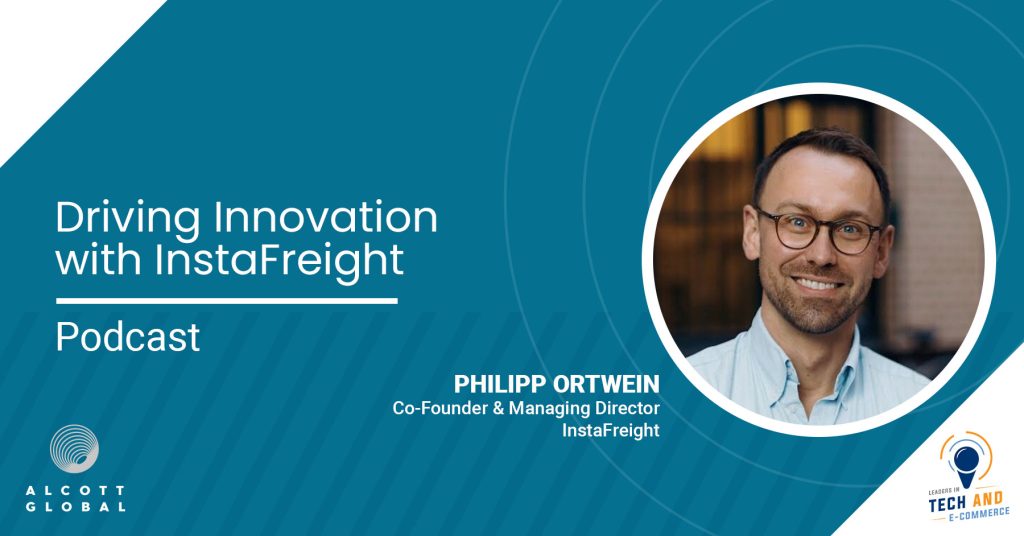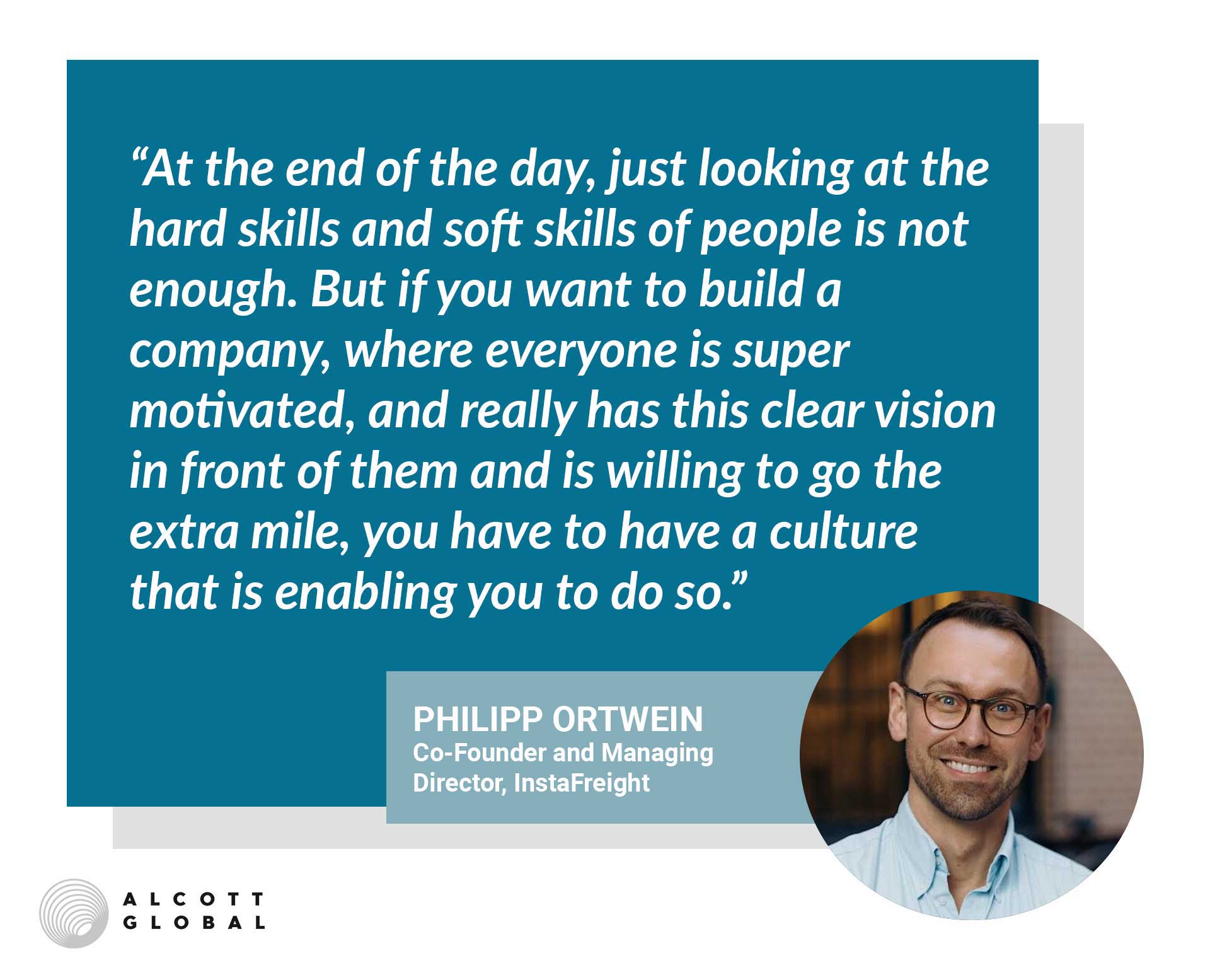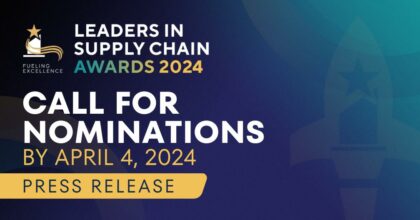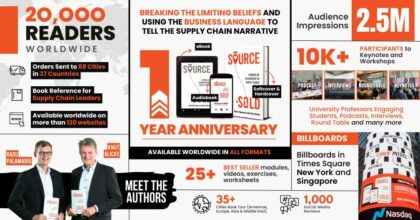Philipp Ortwein is Co-Founder and Managing Director of InstaFreight, a digital forwarding company. He graduated with a Master in Management from the University of Mannheim and did his executive education at Harvard and Stanford.
During 9 years of work experience at Bain & Company and 2 Startups, he gained expertise in digitization and Industry 4.0.
Listen to the full discussion here:
- Listen on Stitcher
Connect with the Host:
Rushit Shah: LinkedIn | E-mail
Connect with the Guest:
Philipp Ortwein: LinkedIn
Some of the highlights from the podcast:
- InstaFreight’s origin story
- How InstaFreight faces challenges in times of disruption
- InstaFreight’s future plans
- Soft skills and hard skills to be successful at InstaFreight
- Maintaining the company culture intact
Show notes:
- [1:06] How did the idea of InstaFreight originate and how did you become part of it?
- [2:03] What really intrigued me was logistics because I think it is one of the largest markets out there, which is still working as they worked. We hit the road back in 2016 making the road freight market more easily accessible to shippers and this is really what makes us proud that we manage to bring change to the industry.
- [3:32] Can you tell us exactly the scale of the business back then in 2017, 2018, and now in 2022?
- [3:40] We started off in a very traditional way and there were basically two guys on the desk and right now, we are around 230+ people working out of Berlin, which is our headquarters and then in terms of sales, we try to be as close to the customer as possible.
- [7:31] Is Europe the focus for now or do you plan to expand to Northern America and Asia?
- [7:38] In terms of technology, you can basically go anywhere but for now, the key focus is on Europe. We actually do have a company that is using our technology in Australia, but InstaFreight is gonna stay in Europe for now.
- [8:34] What percentage is operational freight forwarding and what percentage is for technology side, in terms of where you want to grow the business?
- [8:51] Roughly 30% of our business is coming from transport management, meaning the 4PL and the other two-thirds is coming from freight forwarding.
- [9:12] What’s one problem that you are trying to solve now, especially with this pandemic?
- [9:44] This market is going through significant changes in turbulence but this has to be also a time of big opportunities for us. It is to give reliable access at reasonable cost to our shippers and with access to capacity to our tracking network and enabling shippers to find this capacity directly at the carriers.
- [11:28] Can you share some success stories with one or two of your customers?
- [15:58] How labor intensive is it for you to provide an option to be a strategic sourcing partner for a new client?
- [17:26] We typically have a team of two to three people operating this on a daily basis and that also includes doing spot business.
- [18:33] So, let’s talk about sustainability. How do you really help them identify on how they can kind of reduce their green emission and is there a way where you can kind of highlight that this other thing they can do to be more environmentally friendly?
- [18:47] There are two parts to an answer to this, as we are having the freight forwarding part and the transport management part. As a transport management partner, since we are overseeing the entire freight span of a customer, we are looking into “How can we combine loads in order to reduce mileage” and this is the key difference.
- [24:24] What are the challenges you are facing when it comes to the trucks being delivered from A to B?
- [28:25] With the vision of the company, where do you think in 5 and 10 years down the line? Where is the company going to be and how the Logitech world is going to look like?
- [29:39] Platforms being connected to platforms that orchestrate several different modes of transportation. I think this is what our future is going to look like and then you have multiple platforms working with each other, then providing digital solutions really depending on the requirements of the customer supply chain.
- [30:02] Are there more product lines going to come in or are you going to just grow as a region?
- [30:16] We want to build the most efficient transport solution in Europe for overland. We are happy partnering with whatever is required but we want to build a really big network of carrier companies working very frequently with us where we provide the loads where and when they need it.
- [31:51] In InstaFreight, are you investing in assets like tracking yourself at the moment? Does 40 million goes into buying a lot of trucks and competing with few of the local partners at all or is that something not in the books at all?
- [32:04] We do operate our own fleet, but with our own fleet we don’t have our own assets. Our strength lies in providing the digital solution and connecting with our partners and that also means that the investment that we’ve done, obviously goes into further developing the software.
- [33:36] What would you have done differently when you started this business when you could go back in time?
- [33:44] Honestly, we’ve made so many mistakes, but I think like all in all, we’re extremely happy where we are today with the team that we’ve got. Because at the end of the day, I think investing in the right people very early on is the most crucial thing that you can possibly do.
- [35:06] What skills are required to be successful, especially in InstaFreight?
- [35:10] In InstaFreight, we basically have three different profiles that we hire. One for sure, logistics professionals. The second is what we call “specialists”, people that do have work experience, but from a completely different field and then three, those guys whom we call “Young Guns”, those young driven ones who really challenge how things are being done because if you put these three profiles in a room, you typically get amazing solutions that eventually no one has thought of before and this is what we truly believe that this gives us the edge over more traditional companies.
- [38:37] How are you kind of keeping the culture the same when you’re global?
- [38:54] We developed values together with a team. At the end of the day, just looking at the hard skills and soft skills of people, it’s just not enough. But if you want to build a company, where everyone is super motivated, and really has this clear vision in front of them and is willing to go the extra mile, you have to have a culture that is enabling you to do so.
- [42:29] Do you have any message to our audience about InstaFreight?
- [42:47] Logistics and transport logistics is going through a significant change, and I would like to understand better how you’re dealing with them, then two, coming to the resilience point, enabling them to build and manage their own network and then three, at the end of the day, data is absolute key and making sure that you can take smart decisions and I think this is what we think we are really good at.
Quote from the Episode:
About the Host:
The host, Rushit Shah is the Managing Director of APAC and North America at Alcott Global. Rushit comes with 20 years of Executive Search and Selection with 8 years of Supply Chain Consulting service within APAC. He worked for more than 40 countries with diversified industries and functionality.
Alcott Global connects and upgrades the supply chain ecosystem by finding the right talent through executive search, developing talent through learning solutions, and meeting supply chain technology needs through a comprehensive crunch base marketplace.
The supply chain executive search has been our focus since the very beginning, offering recruitment services for top-tier supply chain roles at every level of the end-to-end supply chain: plan, source / procure, make, and deliver. Our consultants have years of experience in placing top talent, in North America, LATAM, Europe, the Middle East & Africa, and APAC, and besides speed, one of our biggest strengths is our network within the supply chain industry, and we capitalize on it to find the best solutions.
Through the years, we have grown as an organization and our offerings with it. One of our initiatives, the learning solutions- training and supply chain academy, is focused on transforming leadership- self-leadership, executive presence, influence capital, and business acumen. Through Supplify, we aim to match corporations with the top technology companies to solve their supply chain and logistics challenges with a focus on innovation and digital transformation.
We are in constant touch with the leaders in supply chain, inviting them to inspire the supply chain professionals in thought-provoking podcast episodes and events, and showcasing what is possible at the yearly Leaders in Supply Chain Awards.
Related Episodes:
How IndustryApps Is Solving Gaps Within The Supply Chain Industry









